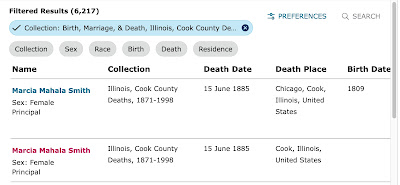Here is what I would do to search for a pre-1916 Chicago death certificate if I wanted to exhaust every possibility that I could think of before reporting back to a client:
1) Check the Illinois Statewide Death Index, Pre-1916 using Stephen Morse's One Step approach.
- Search the given name and surname, as provided.
- Search the given name and surname, leaving off letters. For example, use Mar... if the name is Mary, Maria, Marianna, Marianne, Martha, Marta. Use Ab... Abraham just in case the name is in the index as Abe. You get the idea. Also try just the first letter of the given name.
- Search the surname with the death year.
- Search the given name with a year, if unique. Add a few letters of the surname, if it isn't.
- Check alternate years--a "3" could be misread as an "8" for example.
2) Check the Illinois, Cook County Deaths, 1878-1939, 1955-1994 index at FamilySearch. Remember, though, that the names of parents or spouse won't be useful in searching for records before c. 1908. The early forms didn't ask for that information.
3) Check the Indexes to deaths in the city of Chicago during the years 1871-1933: showing name, address and date of death (also called the "burial permit index"). It's on Family History Library microfilm. It includes out-of-town deaths and sometimes names don't appear in the indexes mentioned above because a Chicago resident died outside the area.
No luck?
Look for a way to confirm the death date and place.
4) Check for an obituary in the Chicago Tribune online. Some libraries offer access or you can get to it through Fold3.
5) Check for an obituary in other Chicago newspapers. If you don't have access, Genlighten's mollykennedy is a pro at finding Illinois obituaries using the resources that are available in Springfield.
6) If you have an idea where the person was buried, contact the cemetery to see if you can find a burial date. Ask if they have information similar to what might be on the death record.
7) Check the Cook County Coroner's Inquest Index, 1872-1911. Remember, this is a pull-out-all-the-stops search. It's worth a try.
7) Check the Cook County Coroner's Inquest Index, 1872-1911. Remember, this is a pull-out-all-the-stops search. It's worth a try.
Still no luck?
8) Scroll through the Family History Library film where the record you're looking for should be.
Use the One Step index linked above to search for a person with the same first letter of surname who died the same month and year as the person you're looking for. Use that certificate number to choose the Family History Library film that would have that record.
Use the One Step index linked above to search for a person with the same first letter of surname who died the same month and year as the person you're looking for. Use that certificate number to choose the Family History Library film that would have that record.
Early death records are arranged in a logical way. All of the "K" deaths for January 1894 will be grouped together, for example. Starting from the record you identified using the index search, scroll back to find where the "K" records for January start. Look through one at a time until you come to "K" records for February.
9) Repeat the process described in #8 using a film from the Cook County (not city) series.
9) Repeat the process described in #8 using a film from the Cook County (not city) series.
Still no luck?
10) Mail in a search request to the Cook County Clerk's Office to see what they can find.
and/or
11) Look for the death in other places. For example, an elderly parent might have gone to stay with an out-of-state child during a last illness.
and/or
12) See if there's a church burial record, especially relevant for Catholic deaths as many of those records are on Family History Library film.
If none of those approaches work, you might be out of luck, but I never say never. You might stumble on the record you're looking for in an unexpected place--a pension file, for example? Or? What other ideas come to mind?
and/or
11) Look for the death in other places. For example, an elderly parent might have gone to stay with an out-of-state child during a last illness.
and/or
12) See if there's a church burial record, especially relevant for Catholic deaths as many of those records are on Family History Library film.
If none of those approaches work, you might be out of luck, but I never say never. You might stumble on the record you're looking for in an unexpected place--a pension file, for example? Or? What other ideas come to mind?




No comments:
Post a Comment